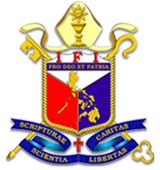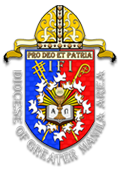HEALING THE NATIONS

Reflection for 4th Sunday in Lent; March 14, 2021, Sunday
By: The Rev. Vicky Esguerra
BACKGROUND
In the Old Testament the Book of Numbers is the continuing story of the Israelites’ Exodus from Egypt where God saved His people from the atrocities of the Egyptians. The Israelites were saved to serve and were supposed to journey into the promised land, Canaan; BUT THE PROMISE WAS DEFERRED. It took two years from Egypt to Mt. Sinai where Moses received the two tablets containing the “Ten Commandments;” and then the Israelites forgot about their covenant with God as they worshiped the golden calf. It took another 38 years from Mt. Sinai to Kadesh-Barnea, the desert south of Beersheba where their wanderings took place. The 350km/220mile sojourn (normally taking only two to three weeks) became a lifetime journey of a total of 40 years to the point of entry to the promised land. These meanderings in the wilderness of Shur and Paran were marked by complaining, moaning (murmurings), warfare, and rebellion; but God, loving His people, supplied all their needs: leaders (Nos. 1:1,3), food (Nos. 11:6-9), meat (Nos. 11:31-33), water (Nos. 20:8), and promised them a land “flowing with milk and honey” (Nos. 14;7,8).
God had planned for them to go straight to Canaan, but instead sent 12 spies to survey the land which took 40 days. They reported back that the promised land was indeed “flowing with milk and honey” but the Canaanites were “great in stature” so that they became afraid and did not trust God. Only two of the twelve spies, Joshua and Caleb, recommended to proceed with the invasion. God was displeased with their lack of faith and decided to strike them with pestilence. All those over twenty years old, except Joshua and Caleb, would have to die. A new generation had arisen from the wanderings from the numbers that left Egypt (approximately 600,000 men; not counting the women and children, or 2-3 million if included), but many also died from the hardships in the wilderness. All those who left Egypt had died; even Moses, Aaron, and Miriam were denied entry into the promised land. So, these young and healthy people, led by Joshua and Caleb, were welcomed anew into this land of promise and they became the new land inheritors, the new Israel, who were strong believers in their God Yahweh.
BRAZEN SERPENT (Numbers 21:4-9)
It was in this scenario that the event in the pericope took place. The King of Arad, a Canaanite, fought against Israel and some were taken captives. The Israelites prayed for assistance from God and they were able to destroy them and their towns. While en route around Edom, they became impatient and again murmured along the way; complained against God and Moses for their miserable condition and the lack of food and water. With God displeased, He sent poisonous snakes among the Israelites and they were bitten to death. However, on behalf of and upon their request, Moses prayed for mercy from God. Then God told Moses to make a bronze serpent to hang on a pole; and those who were bitten by the snakes only needed to look at it and their lives were spared.
The message of the Book of Numbers saw a merciful, loving God gathering His people and numbering them as precious in His heart. He dwelt with them in their camps and guided their way through the wilderness with the cloud by day and the pillar of fire by night. By giving them the Tablets of the Law (Ten Commandments), the Tabernacle, and the priests assigned in their midst, He provided for law and order for His people. However, they broke the Covenant and worshiped other gods (golden calf); complained for sustenance (food and water) and longed to go back to Egypt where they would rather be slaves; and the above-20 generation refused to enter the promised land due to the lies of the spies that the Canaanites were “giants”. Even Aaron and Miriam were envious of the role Moses played as chosen by God to be their leader. They put their God to the test with their greed, selfishness, impatience, discontent, jealousy, thereby alienating themselves from their God. The Lord disciplined them with the sting of the serpent, akin to the sting of sin or death. Nevertheless, despite all their grumblings, God still listened to their confessions and provided for the healing instrument through the brazen serpent.
CHRIST ON THE CROSS (John 3:14-21)
In the New Testament the counterpart of the Brazen Serpent is Jesus on the Cross. “Just as Moses lifted up the serpent in the wilderness, so must the Son of Man be lifted up, that whoever believes in Him may have eternal life” (John 3:14). Jesus explained to Nicodemus (member of Sanhedrin, model Pharisee, and master in Israel): “’For God so loved the world that He gave His only Son, that everyone who believes in Him may not perish but may have eternal life.’” (John 3:16). Theologian and biblical scholar A.T. Pierson explained in a nutshell the Gospel in miniature, as Jesus spoke to Nicodemus: “God gave His only begotten Son,” greatest of gifts; “the world,” greatest of numbers; “everlasting life,” greatest of blessings; “might not perish,” greatest of deliverances; “God so loved,” greatest motive; “God,” greatest security; “whosoever believes,” greatest simplicity.
The “darkness in the world” (John 3:19) referred to the sins of the people: the self-righteous people (Sanhedrin, Pharisees and Sadducees), the hypocrites and idolaters, the atheists and nonbelievers, the liars and traitors, the offenders of the marginalized and human rights violators, the religious but rejectors of Jesus’ Messiahship (Savior/Redeemer), etc. The sins of the people during Jesus’ time and our time are akin to the sins of the Israelites in the wilderness which are offensive to God. In our own context, the immoralities of these sins are similar: violence against women and children; military vilification against the prophets of our time (the Church); racism and bigotry; indifference and neglect of the poor, voiceless and powerless; human rights violations; economic impoverishment; crises mismanagement (pandemic and natural disasters); destruction of creation and natural environment; etc. Our personal and collective transgressions put us in the wilderness of sin alienating us from the love of Almighty God. But the unbounded love of God is never withdrawn though we may have to go through a time of discipline, like the Israelites’ experience of the pestilence.
Through our confession, repentance, and transformation in this Lenten Season, as we sincerely observe the Passion and Crucifixion of our Lord Jesus Christ, may we be reminded of Jesus’ Cross redeeming us from our sins by overcoming the sting of death as He gloriously rises on Easter Day. May the Cross of Christ be the symbol of God’s healing the world as one through the loving grace of God, Father, Son, and the Holy Spirit. Amen.


